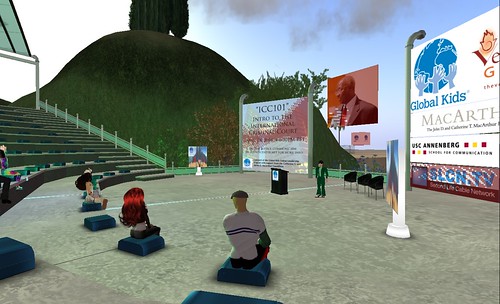Today I helped organize a pretty successful mixed-reality Global Kids event, featuring Dr. Francis Deng, the UN Special Representative on Genocide, speaking about Darfur and the UN’s response to situations like these. The Online Leadership Program of Global Kids, which I’m a part of, is making concerted efforts to coordinate our work more closely with other Global Kids’ programs that focus on New York teens. While Second Lifers know about Global Kids as being innovators in virtual world education, our main work is face-to-face with thousands of real world teens in 25 schools in the wider New York City area.
My colleague Shawna and I developed a quick-and-dirty way of taking a program organized by the Global Kids Summer Institute at the Council on Foreign Relations and bring it into Second Life and Teen Second Life.
Shawna and I looked at the program planned for the Summer Institute participants to see what we would be the best fit to bring into Second Life. While there were a number of interesting subjects being dealt with during the Summer Institute, from climate change to humanitarian intervention, we felt that an event focused on Darfur would be of interest both to our community of teens on the Teen Grid and to the adults involved with the International Justice Center on the main grid. And hearing from a UN Special Representative on Genocide, who himself is a Sudanese national, talking about Darfur, seemed like too good of an opportunity to pass up.
Shawna worked with the Summer Institute organizer Eddie Mandry to get an idea of what the real world teens would be doing to prepare for Dr. Deng’s speech. They were doing a roleplaying exercise where different groups of teens got to represent various actors — from the Sudanese government to the ICC to the international community — and come up with their actions in response to the Genocide in Darfur. Shawna adapted this roleplay activity to work with our teens on Global Kids island, which reportedly went quite well. (On the Main Grid, we skipped the roleplay, which I don’t think would have worked as well with adults.)
The actual presentation by Dr. Francis Deng was easy to capture and stream. All it involved was a laptop connected to the internet, a decent USB mic, and a program to set up an MP3 audio stream (we used Nicecast). We probably could have done a full video broadcast, but that seemed too iffy to arrange given the wifi-only environment and the challenges of ensuring a reliable video stream into Second Life.
Keeping the adults and teens engaged with the speaker was another challenge. It’s one thing to be a teen in the same room as an elder Sudanese UN official speaking directly to you. It’s another to hear a disembodied voice come out of your computer speakers. So we had to find ways to keep our audiences engaged, by having them comment on what Dr. Deng was speaking about, and asking them to submit questions that we could pose to the UN Special Rep. I think we largely succeeded, but it’s definitely hard work.
Getting the real world participants to understand and connect with what was happening virtually was another task. One way was to make sure that the moderator asked for questions from the virtual participants, which we collected and passed along to Dr. Deng. A better way was to have projected onto a screen a live image of Second Life, so that the speaker and the teens could envision what the virtual participants were experiencing. An even better way would be to let the virtual participants speak for themselves and have Second Life voice projected into the room. We didn’t do this for this program, but I’d like to try and arrange it in the future.
Fortunately, the teen and adult participants all asked excellent questions. Dr. Deng handled them all carefully and diplomatically, as expected. If we had some post-event processing with the participants, I would have loved to get them to think about what things were left unsaid by the senior diplomat, and why.
Numbers-wise, we had the attendance we expected given the timing of the event (summer, early afternoon): a half-dozen on the Teen Grid, another dozen in the Main Grid. As an experiment, it was a success. But for an established mixed-reality program we would have to think more intently about outreach and scalability.
For now, I’m satisfied that Shawna and myself, with the help of our colleague Rafi and GK fellows Sean and Michael, did our respective jobs competently, organized a unique and important mixed-reality event, and pushed forward the work of Global Kids and the Online Leadership Program.
Here’s a link to a nice article about the Global Kids Summer Institute on the New York Department of Education website.

I’m curious why you didn’t have Dr. Deng make an avatar and come into SL, or was there some technical reason for that?
It was mostly a time issue, since we didn’t know for sure that we were doing this particular program until literally a week ago.
Also since it was happening on both the Teen Grid and Main Grid, we would have to make an avatar for both spaces, which isn’t simple to do.